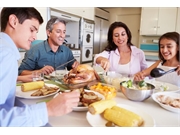- Could Your Grocery Store Meat Be Causing Recurring UTIs?
- Are You Making This Expensive Thermostat Error This Winter?
- Recognizing the Signs of Hypothyroidism
- 10 Strategies to Overcome Insomnia
- Could Artificial Sweeteners Be Aging the Brain Faster?
- Techniques for Soothing Your Nervous System
- Does the Water in Your House Smell Funny? Here’s Why
- Can a Daily Dose of Apple Cider Vinegar Actually Aid Weight Loss?
- 6 Health Beverages That Can Actually Spike Your Blood Sugar
- Treatment Options for Social Anxiety Disorder
Keeping Kids Slim, Fit During Lockdown Isn’t Easy: Here Are Some Tips

Lots of TV time, no PE classes, and a fridge full of food: It’s a recipe for weight gain for kids under “stay at home” rules.
But there are ways parents can help them stay healthy, says registered dietitian Audrey Koltun.
“During quarantine, we hear we should try to stay healthy, not overeat, and exercise, but it is easier said than done,” said Koltun, who’s also a diabetes care and education specialist at Cohen Children’s Medical Center in New Hyde Park, N.Y.
When it comes to kids’ diets, having to stay at home might have some advantages, she noted.
“Many people are cooking much more than they ever did,” Koltun said, and “this allows more control over caloric intake and possibly healthier options.”
Children just don’t have the same access to fast food or fattening snacks. “The kids that go out to get an 800-calorie smoothie, a 400-calorie iced coffee, or a 500-calorie slice of pizza are not having this now — or not as much,” Koltun said.
But if chips, cookies and other snacks crowd kitchen cupboards, the battle against weight gain can easily be lost, the nutritionist stressed.
“Your kids can only eat what you buy, so if you are buying a year’s worth of snacks, they will eat them all day and night,” she said. While chowing down on unhealthy snacks might seem comforting, “these foods are addicting and hard to stop eating,” Koltun said.
Her advice: “Make a family plan. Plan ahead for meals, plan for exercise, plan for junk food. We need structure.”
Turning quarantine into a goal-setting opportunity for health could be key.
“Have a family meeting to discuss there is going to be a new plan to try to eat healthier and to exercise,” Koltun suggested. “Make a grocery list and plan the meals for the week. Try to be consistent with meal and snack times. Eat at least one meal together. Make a list of snacks: healthy and unhealthy.”
On the healthy snacks list: fruits, vegetables with a dip, guacamole or hummus, nuts, light popcorn, lower-sugar yogurts, yogurt parfaits, homemade smoothies — there are many options, Koltun said.
Letting kids choose those healthy snacks makes it more likely these foods will get eaten, she said. And a total ban on fatty or sugary foods isn’t necessary.
Instead, “have the kids choose what healthy snacks they want in the house and keep these in the front of the refrigerator or cabinet. Limit treats to one salty snack and one sweet snack to have each day, at most,” Koltun said.
As for drinks, “keep sugary drinks out of the house — soda, sweet tea, fruit juice, punch, lemonade, sports drinks,” Koltun said. “Water, seltzer and low-fat/fat-free milk are better choices.”
And don’t forget the other half of the healthy lifestyle mix: exercise.
“For exercise, make a plan to get up and move every day for a minimum commitment of 15 minutes to start, if possible,” Koltun said. “Physical activity should be scheduled. This can be taking a walk, jumping on a trampoline, online videos, going up and down stairs, even dancing.”
More information
There’s more on helping kids eat right and stay slim at the Academy of Nutrition and Dietetics.
Source: HealthDay
Copyright © 2026 HealthDay. All rights reserved.










